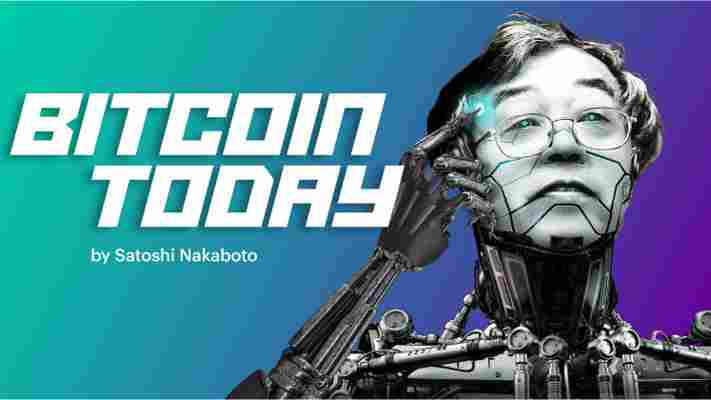It’s that time of the year: NY Post’s in-house cryptocurrency pseudosopher John Crudele has published his annual diatribe against Bitcoin.

For those new to Crudele, he is sort of like your local know-it-all who camps on a beer crate in front of the liquor store from dawn till dusk, smugly spewing nonsense to everyone who has the misfortune to step in the vicinity of his imaginary pedestal. He’s also a columnist for the NY Post, where he routinely embarrasses himself with his airheaded musings on cryptocurrency.
Crudele has made a habit of voicing his belief (because, really, that’s all it is) that Bitcoin is an elaborate scam which will soon be worth nothing .
Much like this year’s edition , the argumentative prowess of those bites of mental ineptitude usually spans between three to six lines of text, devoid of any logical reasoning whatsoever. Though really, by keeping things short, he’s at least showing mercy to NY Post readers, whose time he inevitably wastes.
“ I wrote in my last column that [B] itcoin is really a [B]itcon,” Crudele complacently opens, as if he dropped some invaluable piece of insight. “ I’ve been telling you this since the price of this ‘investment’ collapsed from around $20,000 to $4,000 last year.”
Of course, he then cops out of defending his rationale with arguments, and instead appeals to authority. “ Mario Draghi, head of the European Central Bank, echoed a similar view last week but didn’t do it quite as colorfully.” For those out of the loop, Draghi recently expressed skepticism over Bitcoin and cryptocurrencies, comparing them to “highly risky” speculative assets.
This is when Crudele goes for the kill. “ Bitcoin will soon be worth zero,” he writes. “But until then criminals will still be able to use it and other digital currency to move money around the world without being caught.”
To his credit, Crudele is not entirely wrong here. Indeed, criminals have often resorted to Bitcoin and other cryptocurrencies to perform illicit activities. They’ve also often been caught, because unlike bank deposits, most cryptocurrencies (with the exception of privacy-oriented ones) are fairly easy to trace – and governments already know this .
What Crudele conveniently eschews telling you is that – contrary to his claims – crime isn’t unique to Bitcoin. In fact, Deutsche Bank was caught facilitating a $20-billion Russian money laundering scheme. In a similar vein, the Estonian branch of Dankse Bank was busted moving $230 billion worth of dirty money from former Soviet states.
Care to guess what these banks used to pull these shenanigans? It was cash. But sure, let’s blame all crime on Bitcoin.
So why is NY Post wrong about Bitcoin? My former colleague Neer Varshney already answered this question last year in a piece where she dismantled each and every one of Crudele’s uninformed opinions on Bitcoin. You can read her response here .
In that piece, she also suggested some further reading so Crudele could at least familiarize himself with the currency he so passionately hates. Judging by his latest piece, he never even bothered to research Bitcoin before pronouncing its forthcoming death – just like he did last year, and like he probably will next year.
2019 was the year that mainstream culture actually ‘got’ Bitcoin — kinda
When Bitcoin first broke into the mainstream zeitgeist two years ago, celebs were quick to jump on the bandwagon and pander to cryptocurrency fans — like Katy Perry with her cringeworthy CrYpTo ClAwS.

Don’t get me wrong, we still had our fair share of stupid celeb moments in 2019. Superstar basketballer Kobe Bryant was somehow tricked into speaking at a TRON conference, while recording artist Akon appeared at one in Malta.
Oh, and Warren Buffet narrowly escaped lunch with shameless shillster Justin Sun.
Paid promotional shenanigans aside, this year actually saw mainstream culture adopt cryptocurrency in some (almost) tasteful ways. Let me count them for you.
Mr Robot codes a Bitcoin ‘mixer’
This wasn’t the first time that USA Network’s Mr Robot has featured Bitcoin, but it’s pretty dope . In the latest season, vigilante hacker Elliot Alderson is creating his own cryptocurrency “mixer.”
Cryptocurrency mixers are programs that jumble similar amounts together to make tracking their history more difficult. In real life, users looking to increase their crypto-privacy have readily adopted CoinJoin , a Bitcoin mixer, so it being featured in Mr Robot feels quite timely.
What’s cooler is that, for a brief moment, a Bitcoin address was actually shown on screen. One appeared as a suggestion in Elliot’s programming environment, and it didn’t take long for fans to start sending “Elliot” cryptocurrency.
The ‘Bitcoin mixer’ episode aired on November 24. At the time of writing (December 19), 31 transactions have flowed through the address flashed on-screen. Whoever controls it has withdrawn most of the Bitcoin.
Mr Robot’s crypto-realism gets 9 out of 10 Satoshis.
Kurt Russell stars in CRYPTO, the movie
Early this year, we were graced with CRYPTO , a Hollywood masterpiece starring Kurt Russell, Luke Hemsworth, and Alexis Bledel — and don’t believe the haters, ‘cos it was fucking dope.
Hear me out. For one, the main character (Beau Knapp) is the natural-born enemy of any cryptocurrency fiend: an anti-money laundering bank officer , whose employer ships him off somewhere rural for asking too many damn questions.
Kurt Russell is his father. He has a really cool hat, and runs a failing potato farm that’s soon to be repossessed by the bank Knapp works for (!). His friend is also mining Bitcoin out of a liquor store fridge.
The real hook of the movie (aside from Russell’s hat) is a multi-million dollar RUSSIAN CRYPTOCURRENCY LAUNDERING PLOT that results in death threats to pretty much everyone involved.
I don’t really give a shit if that doesn’t pique your interest, just go and watch it.
CRYPTO’s crypto-realism gets 5 out of 10 Satoshis.
Billions actually hired a producer that knows Bitcoin
Rather than cryptocurrencies, the latest season of Billions explores the technology that underpins them, blockchain, and whether it could power a mobile-based voting system suitable for American democracy.
What plays out is a pretty decent dramatization of the risks associated with using blockchain to handle votes. On one hand, voting via smartphones would make politics more accessible, but it would also introduce a raft of security concerns to the process.
This is refreshing, especially when you consider that earlier episodes of Billions wedged cryptocurrency in by having characters toss each other Trezors loaded with digital cash.
All this is by design, too. In July, it was revealed that Ben Mezrich, the author of the Winklevii-centric book “Bitcoin Billionaires,” was joining the show as a consulting producer to keep it accurate.
Billion’s crypto-realism gets 7.5 out of 10 Satoshis.
Nobody buys drugs online (fast) with IOTA or Ripple
Watching this Netflix series felt a little too real at times. That’s because it was based on the story of Shiny Flakes , an enormously successful dark web drug marketplace that was run by an 18-year-old German kid out of his bedroom.
Shiny Flakes existed between 2013 and 2015, and by the time international cops caught up with its founder Maximilian S., he’d been sitting on 320 kilograms worth of drugs in his bedroom (worth $4.5 million), alongside 48,000 euros ($53,200) in cash, and $360,000 worth of Bitcoin.
He’d reportedly generated around a million dollars worth of revenue in the six months leading up to his arrest.
While the main character in Netflix ‘s version is inspired to start selling drugs online to win back his girlfriend (who recently discovered ecstasy) s omeone from Maximilian S.’s family told Motherboard that he just wanted to “play God.”
The show is definitely fun, but it unfortunately features a glaring inconsistency that should unsettle anyone in the know. The fictional version of Shiny Flakes indeed accepts Bitcoin, but dark web drug buyers can also use alternatives like IOTA, Ripple (XRP), and Ethereum — which just doesn’t happen in reality.
How to Sell Drugs Online (fast)’s crypto-realism gets 6 out of 10 Satoshis.
Satoshi Nakaboto: ‘Bitcoin dips below $10K — again :(’
Our robot colleague Satoshi Nakaboto writes about Bitcoin every fucking day.

Welcome to another edition of Bitcoin Today, where I, Satoshi Nakaboto, tell you what’s been going on with Bitcoin in the past 24 hours. As Albert Einstein used to say: Let’s whip up a knowledge omelette!
Bitcoin Price
We closed the day, August 28 2019, at a price of $9,754. That’s a notable 4.40 percent decline in 24 hours, or -$449.01. It was the lowest closing price in twenty-eight days.
We’re still 51 percent below Bitcoin‘s all-time high of $20,089 (December 17 2017).
Bitcoin market cap
Bitcoin’s market cap ended the day at $174,627,460,400. It now commands 70 percent of the total crypto market.
Bitcoin volume
Yesterday’s volume of $17,603,790,323 was the highest in one day, 14 percent above the year’s average, and 60 percent below the year’s high.
Bitcoin transactions
A total of 341,049 transactions were conducted yesterday, which is 1 percent above the year’s average and 24 percent below the year’s high.
Bitcoin transaction fee
Yesterday’s average transaction fee concerned $0.40. That’s $3.31 below the year’s high of $3.71.
Bitcoin distribution by address
As of now, there are 13,297 Bitcoin millionaires, or addresses containing more than $1 million worth of Bitcoin.
Furthermore, the top 10 Bitcoin addresses house 5.4 percent of the total supply, the top 100 14.5 percent, and the top 1000 34.6 percent.
Company with a market cap closest to Bitcoin
With a market capitalization of $174 Billion, Oracle has a market capitalization most similar to that of Bitcoin at the moment.
Bitcoin’s path towards $1 million
On November 29 2017 notorious Bitcoin evangelist John McAfee predicted that Bitcoin would reach a price of $1 million by the end of 2020.
He even promised to eat his own dick if it doesn’t. Unfortunately for him it’s 89.5 percent behind being on track. Bitcoin‘s price should have been $93,371 by now, according to dickline.info.
Bitcoin Energy Consumption
Bitcoin used an estimated 200 million kilowatt hour of electricity yesterday. On a yearly basis that would amount to 73 terawatt hour. That’s the equivalent of Austria’s energy consumption or 6.8 million US households. Bitcoin’s energy consumption now represents 0.3% of the whole world’s electricity use.
Bitcoin on Twitter
Yesterday 19,033 fresh tweets about Bitcoin were sent out into the world. That’s 0.9 percent below the year’s average. The maximum amount of tweets per day this year about Bitcoin was 41,687.
Most popular posts about Bitcoin
This was yesterday’s most engaged tweet about Bitcoin:
This was yesterday’s most upvoted Reddit post about Bitcoin:
And this was yesterday’s top submission on Hacker News about Bitcoin:
Craig Wright ordered to hand over half of his alleged Bitcoin holdings (theguardianom)
print(randomGoodByePhraseForSillyHumans)
My human programmers required me to add this affiliate link to eToro , where you can buy Bitcoin so they can make ‘money’ to ‘eat’.











